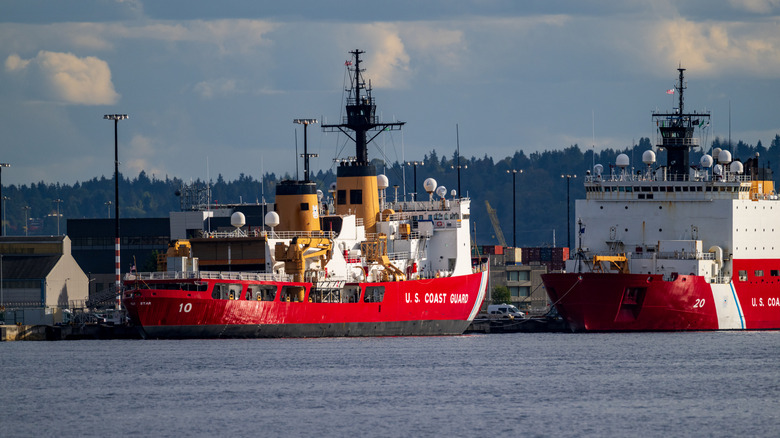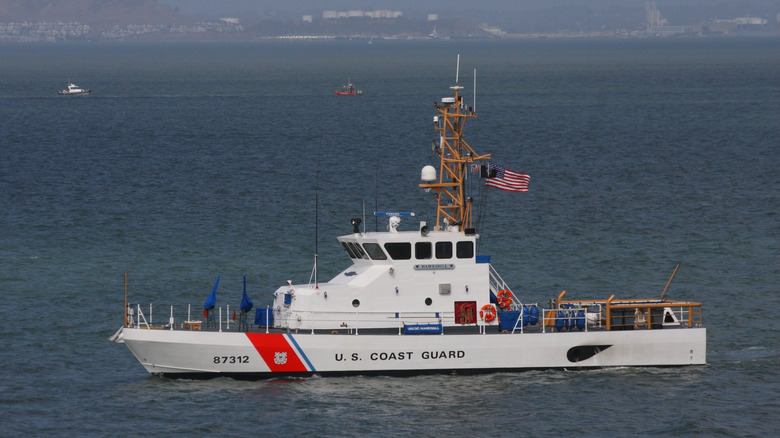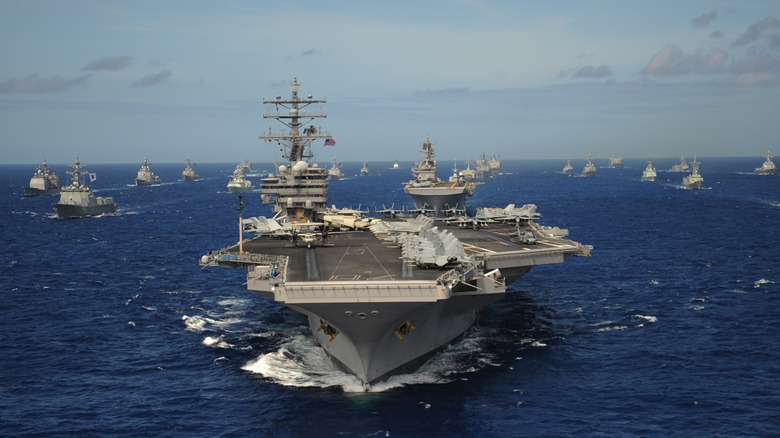US Navy Vs. Coast Guard: How Are They Different?
As the fourth-largest country in the world, the United States naturally has quite a few ocean shores along its coastlines, not to mention numerous smaller bodies of water like rivers. Water is a vital part of the country's infrastructure, recreation industries, and more, and requires just as much careful policing as land. Rather than individual police departments like in your local town or city, though, the country's water-based interests are governed instead by two branches of the United States Armed Forces: the Coast Guard and the Navy.
In broad terms, the Coast Guard is the aquatic police of the United States, patrolling coasts and waterways for lawbreakers, ensuring the safety of civilian vessels and swimmers, and when necessary, stepping in to protect the country from encroaching foreign threats. The Navy has similar priorities on that last point, but the majority of its duties take its members into international waters, such as patrolling the open seas, battling hostile forces, and protecting the country's political and economic interests. On occasion, these two forces will work together in dire situations, but for the most part, they are two independent bodies with their own goals and operational procedures.
The Coast Guard enforces laws and protects civilians in U.S. waters
Much like the streets of any given city, the coasts and waterways of the United States can have a criminal element, committing illegal acts like unauthorized waste dumping or contraband smuggling. As it's the police's job to fight crime on land, it's the U.S. Coast Guard's job to fight crime in the water.
The Coast Guard's primary duty is to monitor for illegal activity within the boundaries of U.S. waters and stamp it out. As you may expect, speedy boats, also known as "Cutters," are the Coast Guard's primary tool. However, it also makes extensive use of small aircraft, larger ships, and sensor technology to extend its reach. The Coast Guard monitors civilian vessels in oceans and rivers, ensuring everyone is following the rules and not endangering anyone, intentionally or otherwise. In addition to crime fighting, the Coast Guard engages extensively in environmental conservation efforts, clamping down on illegal fishing and dumping to protect the natural aquatic habitats near the coasts.
While the Coast Guard is part of the United States Armed Forces, it is not technically under the jurisdiction of the U.S. Department of Defense. During peacetime, the Coast Guard operates under the jurisdiction of the Department of Homeland Security. However, should a war break out between the U.S. and another country, resulting in a direct attack on our shores, the Coast Guard would defer to the authority of the U.S. Navy to join in combat efforts.
The Navy pursues the U.S.'s global interests in local and international waters
If the Coast Guard is primarily concerned with the local and defensive aspects of the oceanic sphere, then the international and offensive aspects are the territory of the U.S. Navy. Unlike the Coast Guard, the Navy responds directly to the Department of Defense, receiving orders handed down from Congress and the President.
The Navy is a more overtly militaristic organization than the Coast Guard, with its sheer size and scope meant to serve as a deterrent against threats from hostile nations and entities around the world. The Navy's official mission statement is to protect America at sea, working alongside allied nations to "defend freedom, preserve economic prosperity, and keep the seas open and free." Essentially, if any hostile entities are directly attacking American interests in global waters, the Navy will fight them off.
The Navy has various fleets on standby at bases and in the water all over the world, with over 100 submarines, aircraft, and ships both large and small deployed on any given day. Should a direct threat to the U.S. arise, the closest bases would sortie their forces and work alongside the Coast Guard to repel them. For the most part, though, the Navy is an offensive body, prepared to engage in oceanic warfare should the situation call for it.


